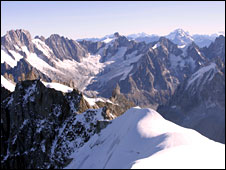Rescued Italian climbers tell their side of the story
 Islamabad - The two Italian climbers who were plucked from a deadly Himalayan peak a day ago said on Friday that they could do nothing to save the life of their third teammate who fell in a deep crevasse last week.
Islamabad - The two Italian climbers who were plucked from a deadly Himalayan peak a day ago said on Friday that they could do nothing to save the life of their third teammate who fell in a deep crevasse last week.
An army helicopter evacuated Simon Kehrer and Walter Nones from the 8,126-metre Nanga Parbat mountain, also dubbed as the "Killer Mountain" to the nearby town of Gilgit, from where the alpinists arrived in Islamabad by a midday flight.
While the team was attempting a new route up Nanga Parbat (the Naked Mountain in the Urdu language), the third member of the team, celebrated mountaineer Karl Unterkirchner, fell to his death in a crevasse.
"It was a little bridge of snow over a deep crevasse, there are so many of this sort up there. Sometimes they collapse by themselves, but this time with weight," Nones told reporters in a press conference held at Pakistan's Ministry of Tourism.
Karl stepped on it and he disappeared before our eyes."
"Simon descended in the crevasse and started digging and then he saw Karl. Simon responded back that there was nothing we could."
Walter said the ice in the crevasse was like cement and Karl fell from more than 15 metres on it and one metre thick layer of snow covered him.
"It was a great tragedy that we lost a good friend of ours, a great climber and the chief of our team. We offer our deep condolences to the wife and three children of our friend who are back in Italy," he added.
Karl Unterkircher was the world record holder for the fastest ascents of Mount Everest and K2.
Following the death of Unterkircher, the two surviving alpinists struggled for their lives for around a week.
"We made the tent where we spent the night. We took one day rest to make the decision how to proceed. When something like that does happen, you only think on what you are doing now," said Kehrer.
He gave details of how the battery of their satellite phone ran out because they had planned the expedition to be one week long and the food they had with them was also running out, but they survived because of the airdrop of food and communication instruments.
"Just hearing the helicopter flying over us gave us a lot of hope," said Nones. "We are very grateful to the Pakistani side which helped us in these days of difficulties."
Even after seeing a close friend die and coming close to losing their own lives, the surviving climbers are determined to continue mountaineering.
"It's a passion. We always risk our lives. We are in God's hands," said Simon.
When asked about risking the lives of others, such as those of the pilots who rescued them, Simon could only reply that they had themselves saved the lives of others. "It's an obligation to save the lives of other people." (dpa)